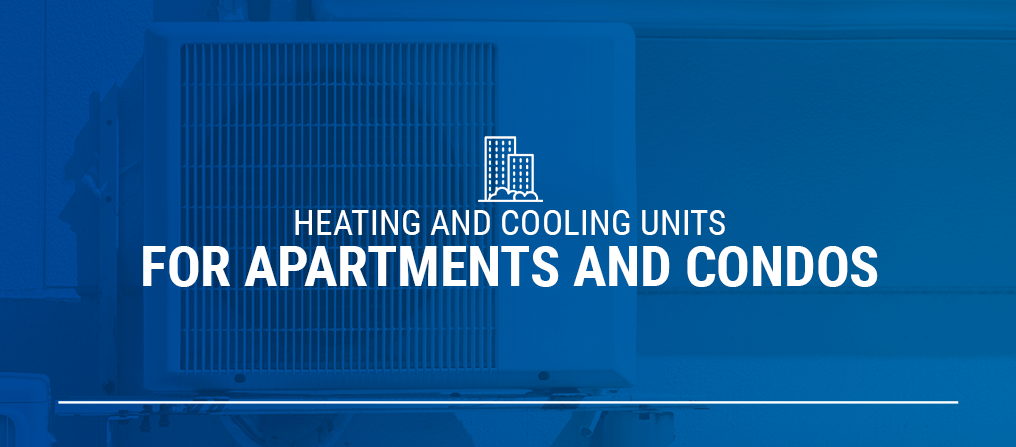
Heating and Cooling Units for Apartments and Condos
If you’re shopping for the perfect HVAC system to condition the air in your home, you’ll need to consider a variety of factors to arrive at the correct decision, including the size of your home, your cooling and heating needs, and — of course — your budget. In this guide, you will find some useful tips on how to pick the right system for your home and discuss the pros and cons of each system type.
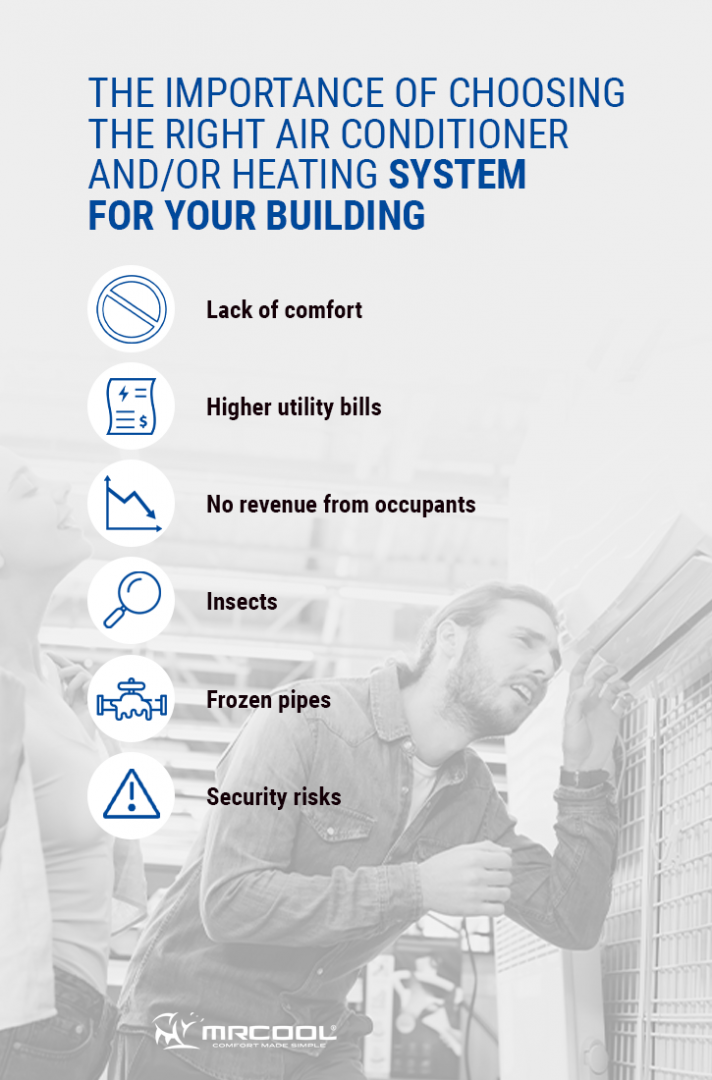
The Importance of Choosing the Right Air Conditioner and/or Heating System for Your Building
Picking the wrong HVAC system for your building can lead to the following issues:
- Lack of comfort: If your system is not strong enough, it will be unable to adequately heat or cool your space, and you’ll be less comfortable.
- Higher utility bills: An overworked or old unit can lead to higher monthly energy costs.
- No revenue from occupants: If you’re a landlord and pay for your tenants’ energy costs, you should make sure the heating and air conditioning systems are as efficient as possible. Otherwise, this could lead to a lower net revenue from your tenants — or even no net revenue at all.
- Insects: Unstable temperatures as a result of an insufficient AC or heating system could attract insects, which can do damage to your building.
- Frozen pipes: An inappropriate system could cause the temperature of the house or building to plummet below freezing, which could cause the water in the pipes to freeze and the pipes themselves to rupture.
- Security risks: If the weather is hot and your system cannot get your indoor air to a comfortable temperature, then you may need to open your windows and doors to cool down. However, having your windows and doors open could pose a security risk, especially if you live in a neighborhood where break-ins are common.
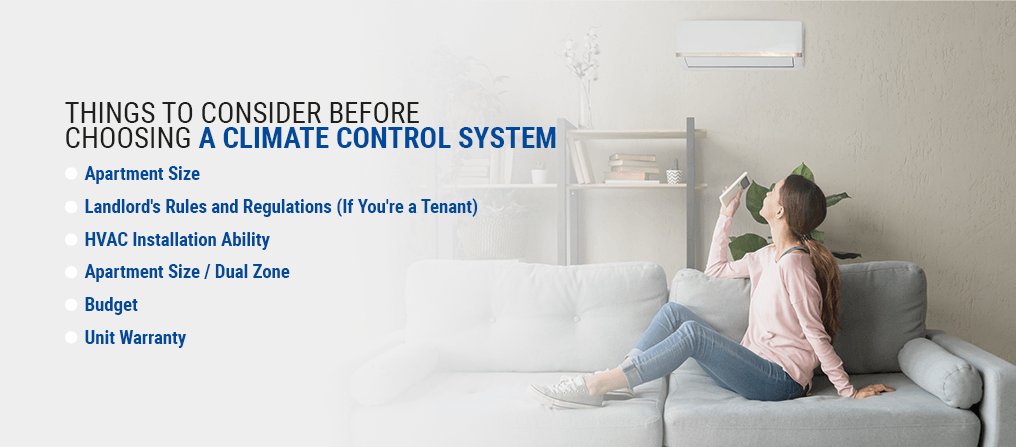
Things to Consider Before Choosing a Climate Control System
Before purchasing an AC or heating system, consider the following factors:
Apartment Size
A crucial factor to consider is the size of the unit, which must be appropriate for the size of your space. If your HVAC system is over-or undersized, your energy bills could end up being very costly. If your heating or cooling system has too much capacity, it will be less efficient, as it will consume a more significant amount of energy to supply heated or cooled air for less space. Also, it will constantly be starting and stopping, leading to premature wear and tear.
If your system has too little capacity, on the other hand, it will not be able to adequately cool or heat your space, which means your area will be less comfortable. This will also cause extra wear and tear as the system struggles to keep up.
Landlord’s Rules and Regulations (If You’re a Tenant)
If you’re a tenant considering installing an AC or heating unit in your apartment, consult your landlord before doing so. Installing certain systems may violate your lease.
HVAC Installation Ability
Some heating and cooling systems cannot be installed in certain buildings. Central air conditioning, for example, requires ductwork and some homes that weren’t originally built with central air may be unable to handle the necessary upgrade. In this case, you will have to consider another type of system.
Apartment Size / Dual Zone
If you prefer different zones of your house to be heated or cooled to different temperatures, you will want to choose a system with that capability.
Budget
You must also figure out how much you want to spend on your heating or cooling unit. While HVAC systems are generally one of the more expensive household appliances, you can find a reasonably affordable unit that could save you long-term, depending on what you can spend.
Unit Warranty
While looking for AC or heating units, don’t forget to consider the warranty — a quality warranty can be a lifesaver if something goes wrong. While most units come with a warranty, they’re by no means created equal. The length of warranties varies from one brand to the next and covers different things. Whereas some cover parts and labor when the unit breaks, others cover only specific components in your unit, such as the condenser or the pump. Before purchasing a unit, make sure you carefully read the warranty so you won’t be surprised if something breaks later on.
Ductless Mini-Split Systems
Ductless mini-split systems consist of two primary parts: the outdoor condenser, which contains the compressor and the indoor unit that handles the air. The indoor and outdoor sections are linked by refrigerant tubing, a condensate drain, suction tubing and power. They are commonly used in multi-family housing units where small apartments or room additions are being built. This system is ideal when installing or extending ductwork is not possible, such as in a man cave located in a basement. They offer various pros and cons, which we’ll cover below.
Pros
A mini-split is a great option for apartment cooling in the following respects:
- No ductwork-related energy losses: Mini-splits don’t require ductwork, so they do not experience the energy losses that forced-air systems do.
- Lots of design flexibility: You can hang a mini-split on your wall, mount it flush into a drop ceiling or suspend it from your ceiling.
- Customizable settings: You can zone mini-split systems, with some models having up to four air handling units indoors connected to a single outdoor unit. Each indoor unit has a separate thermostat, meaning each zone can be conditioned to different settings. This also means unoccupied zones don’t have to be conditioned, which is a considerable energy and money saver.
- Quiet operation: Mini-split systems tend to make little noise when operating.
- Security: Mini-split systems only need a tiny hole bored through a wall, so unlike window-mounted units, a mini-split system will not make your home more vulnerable to intruders.
- Subtle appearance: Mini-splits are small and often do not stand out in a room.
Cons
Depending on your application, however, mini-splits may have a few limitations:
- Requires maintenance: If you’re a landlord and have units installed in many rooms on many properties, this will mean maintenance.
- Cost: Mini-split systems cost a bit more initially than conventional forced-air equipment.
Central Systems
A central air conditioning or heating system conditions and filters air at a central location and then distributes that conditioned air throughout a building via fans and ductwork. If you own a multifamily building with built-in ductwork for heating and AC, then a central system is likely the best option.
Pros
Some advantages of central systems include:
- Consistent air: Whereas a window unit can only cool one or two rooms in a house, a central HVAC system will provide conditioned air throughout your entire space.
- Heating and cooling: Central systems can deliver both heated and cooled air.
- Programmable thermostat: With a programmable thermostat, you can basically tell it when to turn the AC on and what temperature to set it to. This means you can keep your home a warmer temperature when you are away, as there’s no need to cool a house that’s empty. You can also program this thermostat to cool down your house right before returning home.
- One main system to work on: If a central system malfunctions, there is just one unit to repair, which makes things a little simpler.
- Filtered air: Centralized systems don’t just condition your air — they also remove contaminants from the air, which your lungs will appreciate. If you suffer from dust-related allergies, you may want to consider getting a central system.
- No impact on the building’s design: Although installing central air is generally more expensive, it doesn’t affect a residential unit’s overall design, so you don’t have to worry about it disrupting your current decor.
Cons
Cons of a central system include:
- Potentially expensive or impossible: If the building does not already have ductwork, installation of a central system will be difficult or even impossible.
- No personalization of temperature to individual apartments in the building: Unlike mini-split systems, where each zone is conditioned by its own individual unit, with a central system, you cannot set rooms to different temperatures.
- Higher energy bills: Because a central system delivers conditioned air to all areas of a house — including those that may not need conditioning. Depending on the size of your space, this may lead to high energy bills.
- Potential for mold and mildew formation: Although central systems generally require minimal maintenance, they are known to get dirty over time. Mildew and mold can start growing in the ducts, and the air in the ducts may carry it around the apartment, which could cause breathing issues. As long as you stay on top of maintenance, however, you shouldn’t have a problem.
Forced Air Furnaces
Furnaces are a type of central heating system that heat and cool part or all of a building. Burners located in an airtight metal cabinet burn fuels like propane, oil or natural gas. Ducts then allow the combustion gases to travel through the home, where the gases heat or cool air into rooms of the house. Forced air furnaces move heated and cooled air through the house using fans.
Instead of being located outside, like some central heating units, forced air furnaces use air in a closed-loop — pushing or pulling heat from your home depending on whether you’re using air conditioning or heat. Apartments often have these convenient heating systems.
Pros
There are several advantages to using a forced-air furnace, including:
- Easy installation: Forced air furnaces can often integrate with your existing home systems. If your house already has air conditioning ducts, installation can be even easier.
- Quick heating: Since air is heated directly by the system and pumped through ducts around the home, heating time is shorter when compared to systems that require water to be heated up.
- Reliable: Ducts have fewer working parts and are more durable than other systems, decreasing the chance they’ll break down when you most need them. Systems with heat pumps or electricity tend to break down more often than forced-air heating, increasing costs for homeowners.
- Cost-efficient: Forced air systems operate at higher efficiency levels while remaining reasonably priced. The easier installation of forced air furnaces also means paying less for installation.
Cons
Some potential disadvantages can be:
- Noise: Any system produces sound, and homeowners will occasionally hear the air moving through ducts and fans running when using the system.
- Combined temperature control: Forced air has one thermostat to control the temperature in the home. Due to distance and location, some rooms may be warmer than others.
- Potential health issues: Regular filter maintenance prevents dust, mold and other particles from traveling throughout the house. Forgetting this can lead to particles spreading through the home and causing irritation.
Heat Pumps
Heat pumps are two-way air conditioners that heat in the winter and cool in the summer. The unit pulls heat from outside and moves it into the home using electricity. Heat pumps can be ground sourced, air sourced or water sourced systems. Heat pumps can work well for mobile homes since they involve no ductwork.
The type you select depends on location, budget and time you may live in the house. Units work best in areas that remain above 40 degrees Fahrenheit and in less humid climates. For colder regions, you’ll need to install baseboard or central heating.
Pros
Heat pumps are a good option for houses because they are:
- Long-lasting: Heat pumps can last around 12 years, much longer than the lifespan of conventional furnaces.
- Energy-efficient: They’re also very energy-efficient, reducing monthly costs while using less electricity than typical units.
Cons
Cons of heat pumps may include:
- Size: Heat pumps can have an outside and inside unit, both taking up several feet of space. Some are only located outside, so homeowners should have space outdoors for their unit. For apartment buildings, they may not fit or may occupy much-needed indoor footage. Choosing apartment building heating systems that maximize space helps with increasing the available living area.
- Cost: Heat pumps are energy-efficient but have higher up-front installation costs. They act as a long-term investment, paying themselves off over time.
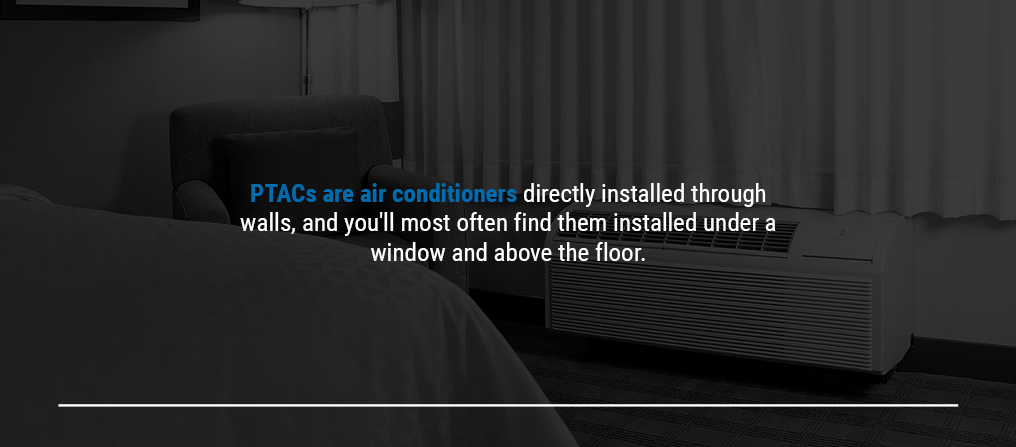
PTAC Units
PTACs are air conditioners directly installed through walls and you’ll most often find them installed under a window and above the floor. You’ve probably seen them countless times but never knew what they were called. If you’ve stayed in hotel rooms, for instance, then you’ve probably been in rooms equipped with this system. They’re also fairly common in offices, sunrooms and assisted living homes.
PTACs are self-contained units or unitary cooling and heating systems. Their main components, like the condenser, compressor, expansion valve and evaporator are located and integrated into one single casing.
Let’s go over the potential pros and cons of this system.
Pros
Having your living space cooled and heated by a PTAC unit offers the following advantages.
- Customizable settings: Unlike central systems, PTAC units function independently, so a unit can operate by itself to condition a room, while other units can be turned off in unoccupied areas.
- Simple operation: A PTAC is so user-friendly and intuitive that anyone can operate it.
- Quiet operation: This is one reason PTACs are found in so many hotel rooms — they’re designed to be quieter than most other systems and won’t disturb your sleep. They may also be an attractive option for your office, as they are unlikely to distract you from your work or drown out a phone conversation.
- Affordable price: PTACs are pretty affordable. If you’re a landlord who owns lots of multifamily housing, this is a desirable option.
- Heating and cooling: PTACs are reversible systems, ideal for cooling in the summer and heating in the winter.
- Energy efficiency: PTACs tend to boast higher EER (Energy Efficiency Ratios) than window units, allowing you to lower your carbon footprint and potentially save on your energy bills.
- Ductless HVAC: Unlike central air, you won’t have to deal with installing ducts’ expensive and involved procedure.
- Improves indoor air quality: Like central air, PTACs also filter the air coming in from outside.
Cons
PTAC systems do have a few disadvantages. These include:
- Installation is quite involved: While you won’t need to install any ductwork, installing a PTAC is still fairly involved.
- Requires outdoor access: Because PTACs need access to the air outside, you cannot install them in interior rooms or below grade.
- Multiple units needed for larger apartments: Unlike central air, a PTAC is only designed to condition a limited area, so if you have a larger apartment, you’ll need to purchase and install multiple units.
Baseboard Heating
Electric baseboard heaters are built into your floor or walls and can control the temperature of individual rooms without requiring ducts and central units. These heating systems are found in many apartment buildings.
Pros
Some baseboard heating benefits are:
- Zone heating: Baseboard heaters let you control the temperature of individual rooms for maximum convenience and comfort.
- Quick installation: Units are cheap and easy to install since there’s no ductwork or outdoor systems needed.
- Quiet: Baseboard heat runs more quietly and disturbs less of the conversation and life in the house than other heaters.
Cons
There are some baseboard heating cons, including:
- Safety risks: Baseboard heaters can get quite hot, increasing the chances of fires and burns.
- Dry heat: Households may experience dry skin from baseboard heat. Humidifiers can counter this, but running them can increase electrical bills.
- Regular cleaning: You should regularly clean baseboard heaters to prevent dust build-up from reducing their efficiency.
- Electric costs: Though inexpensive to install, units use more electricity than heat pumps, making heating in the winter more expensive.
Fans
Ceiling fans are appliances we’re all familiar with — they’re mechanical, powered by electricity and suspended from a ceiling. Although they do not produce cool air per se, they introduce slow movement into the otherwise hot, still air of a room, which induces evaporative cooling.
Below you can learn about the various advantages and disadvantages of ceiling fans.
Pros
Fans are a great option to cool your living space in the following ways:
- Low maintenance: Fans are vastly easier to clean than other systems. If you’ve ever cleaned an air conditioning unit, you are well aware of how much work and time it requires — you have to unscrew the panels and get deep inside the unit to remove all the dust and dirt that can make their way inside the AC units. With a fan, all you have to do is grab a chair and a duster and dust the blades off every now and then.
- Different sizes to match your apartment: Ceiling fans come in various sizes, so you won’t have any trouble finding the right size to suit your living space.
- Efficient: Modern ceiling fans are exceptionally energy efficient. They are miraculously able to cool your space using no more power than that of a high-wattage light bulb, saving you significantly on your energy bills.
- Ductless air: Fans require no ducts to cool down the occupants of a room.
- They cool a room better than many people think: While ceiling fans don’t cool as effectively as AC units, they are an excellent way to keep rooms at consistently cool temperatures since they keep air circulating.
Cons
The main limitation of fans is that they don’t offer any heating.
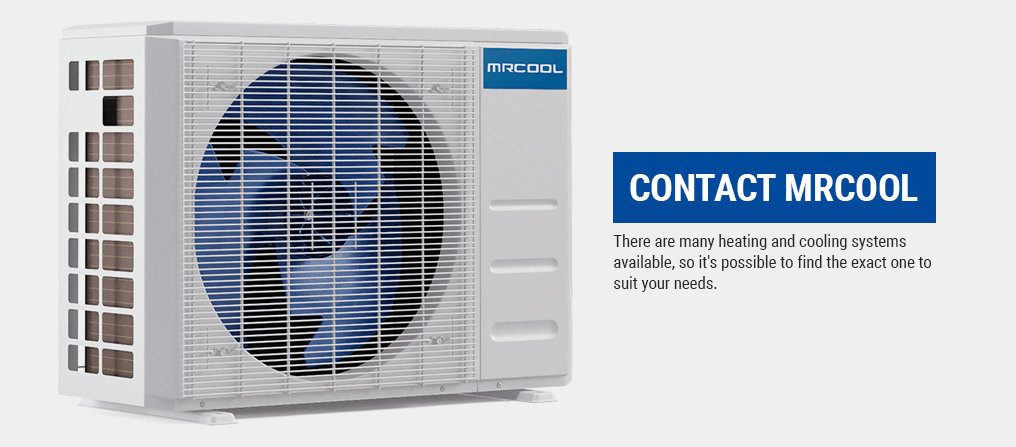
Contact MRCOOL
There are many heating and cooling systems available, so it’s possible to find the exact one to suit your needs. If you would like to learn more about which AC or heating system is suitable for your living space, contact us via our online form to learn more.






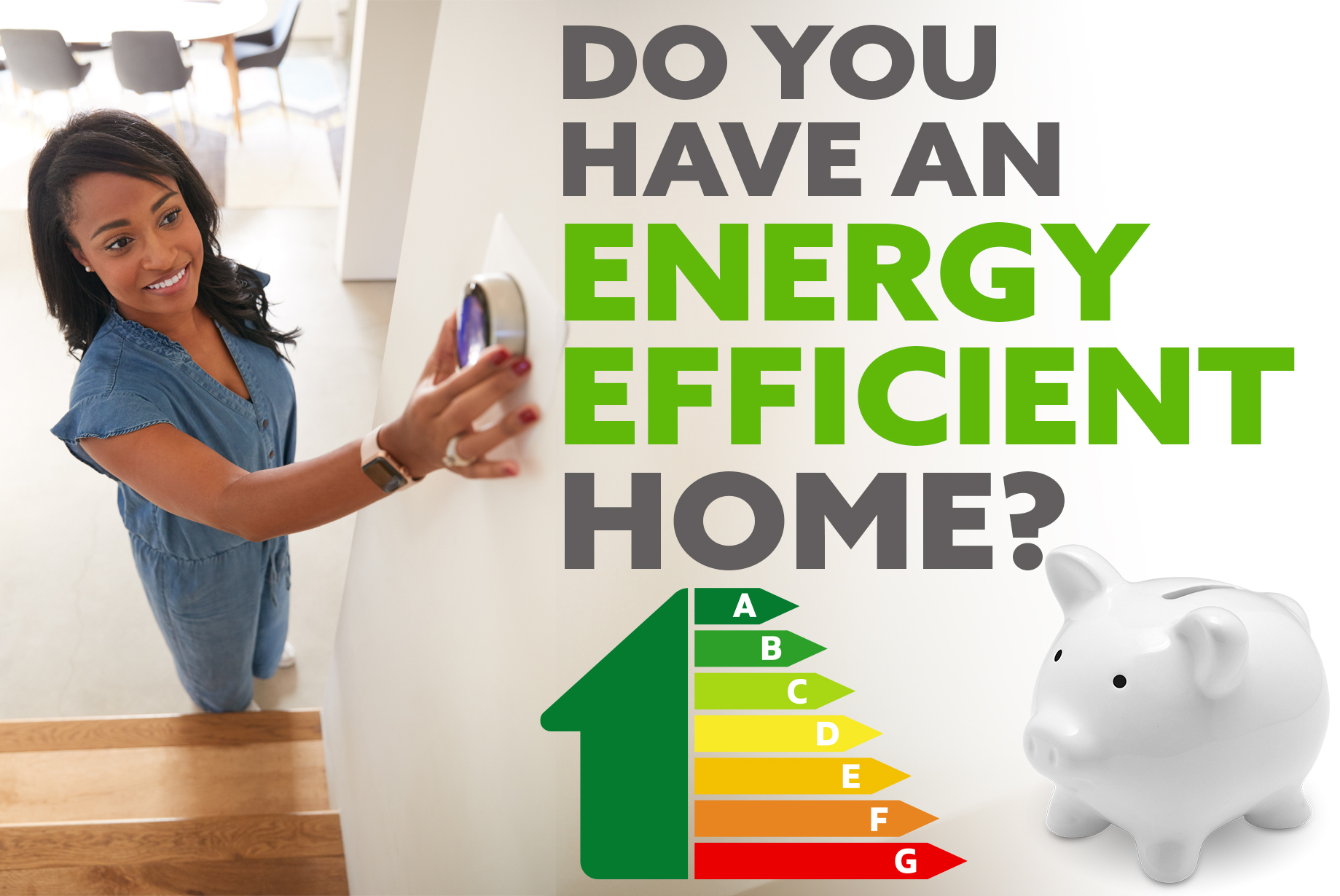

Hello,
I would like to talk to someone to get a new heat system going in my condo.
Thanks,
Please give us a call at 270-366-0457. If you’re interested in heating with the DIY mini split, check out https://mrcooldiy.com/.
Please send pricing and the name of a dealer in Midcoast Maine.
For Mainers, you can contact Selco Plumbing & Heating Supplies at 61 Mill St, Auburn, ME 04210. Their email is [email protected].
Hi, who would be the dealer for NE pennsylvania ?
You may be able to find a MRCOOL retailer near you at https://mrcool.com/where-to-purchase/.
Can I get an estimate?
We do not perform installation services, so we could not provide an accurate estimate of what a local pro in your area might charge.
dear Mr Cool
i am thinking of renovating my 3 bedroom apt in UES manhattan; weighing the difference between replacing the PTEC units vs installing a split system with compressor on the terrace. biggest reason for considering the split system is to minimize noise and space of the PTEC units though from a cost point of view would prefer to stick with PTECs; can you tell me what is the narrowest PTEC unit you have available and the db noise level when working ?
respectfully
andy jagoda
Our PTAC units are all 42x21x16 in size. Size would likely depend on the space you need covered, the 7k is 50/48/46 dB (fan speed: high/medium/low), the 9k is 50/48/46 dB, the 12k is 52/49/46 dB, and the 15k is 53/50/45 dB. Check out the brochure for more information: https://mrcool.com/wp-content/dox_repo/mc-ptac-br-en-01.pdf.
Hello,
I am a property owner of a condo in Carlsbad, Ca and as part of the HOA Association we are reviewing styles of AC units to be easily adapted to each unit. Would a presentation and cost of installation be available to see what the units look like and how easily they can be retrofitted to our building and units.
You may want to give us a call at 270-366-0457 or send us an email on our contact page for that information. You can also find more info on the DIY, including pricing, at https://mrcooldiy.com/.
I’m interested in your system I would like to purchase the system and blog about it on YouTube thank you
Great! Check out a list of our local partners and dealers here: https://mrcool.com/where-to-purchase/
Hi Mr Cool,
We are building a 4 story condo, 60 units. For AC, ideally we’d like to use split-unit systems with 1-condenser/condo (up to 4 fancoil zones) mounted on the roof. The concern is horizontal/vertical runs… we may have run as far as 35’vertical and 125’horizontal. Is there a split unit system that will allow long line-sets?
Hello Bill,
You may want to give us a call at 270-366-0457 so that a member of our team can help you figure out precisely what you need regarding your project!
I live in a nice apt. and recently they detected a small Freon leak in my in-closet air handler unit. They brought in their outside HVAC company and replaced it. Awesome I thought. Here is the problem. Before the unit was whisper quiet – I could only hear the sound of the air flowing. NOW?! Ughh…the unit produces a whine like a dentist’s drill whenever it runs. I brought this to their attention. Unit #2 was smaller and still produces this noise. I would gladly buy a unit that was quiet to replace this garbage with. First, is this just a problem with a cheaper replacement than the first – or a bad install; Second, what is the quietest air handler for a 1200 sq ft apt out there and cost? HELP!? Going nuts listening to this thing!
It could be either. You would need to have an HVAC contractor come out and see specifically what the issue is. Most air handlers, if installed correctly, should be relatively quiet, but a particularly quite air handler might be the Universal’s air handler. Check out more information on the Universal here: https://mrcool.com/mrcool-universal-series-dc-inverter-heat-pump-air-conditioner-split-system/
Do you have any sellers/installers in the north Chicago suburbs?
Take a look at our Where to Purchase and Installer maps to see if there are any MRCOOL retailers or installers near you! https://mrcool.com/where-to-purchase/ and https://mrcool.com/installer-map/.
I own some apartments and need a heat and ac system for each apartment (window unit) windows are 42 inch wide rough opening Everage size of apartment is about 300 sqft.
What unit fits and costs?
We currently do not have heat pump window units. We apologize for any inconvenience.
I think PTAC units are the way to go when it comes to apartments or condos. I usually use the example of hote. Those mostly have ptac units.
I own a condo unit in Coral Gables and need a new Air Conditioner.
Please give us a call at 270-366-0457, or visit our Where to Purchase page to find a dealer near you!